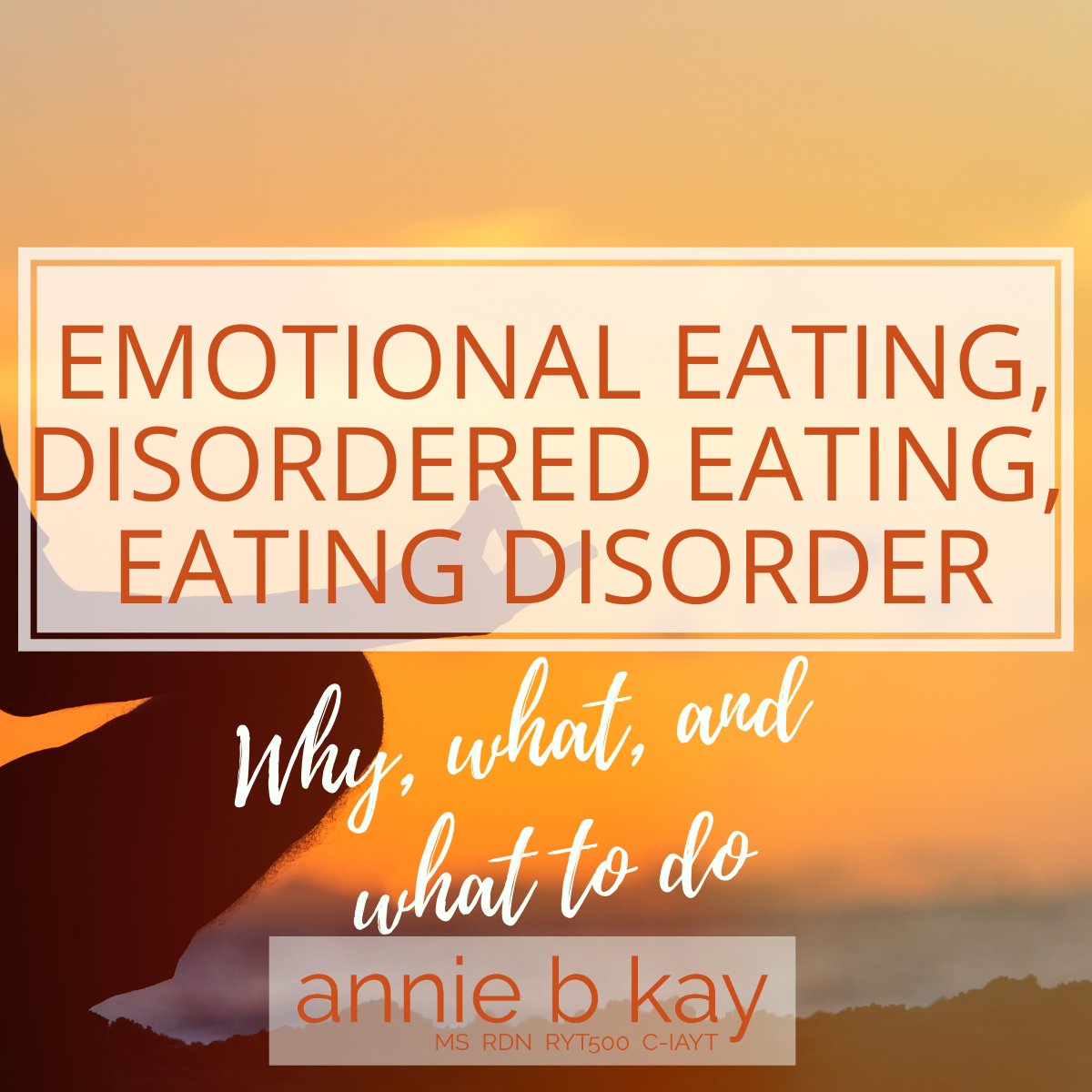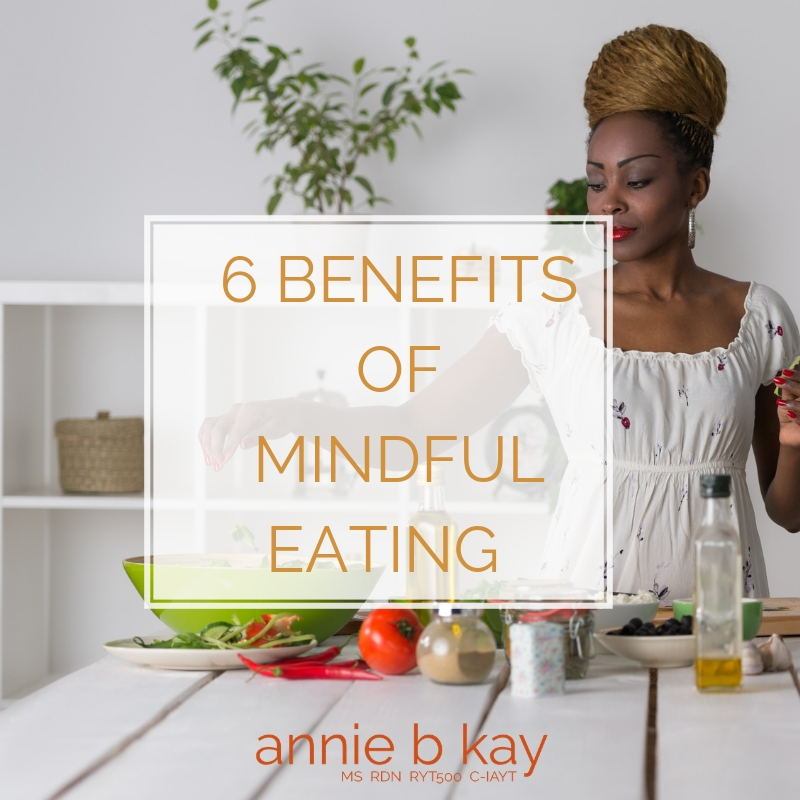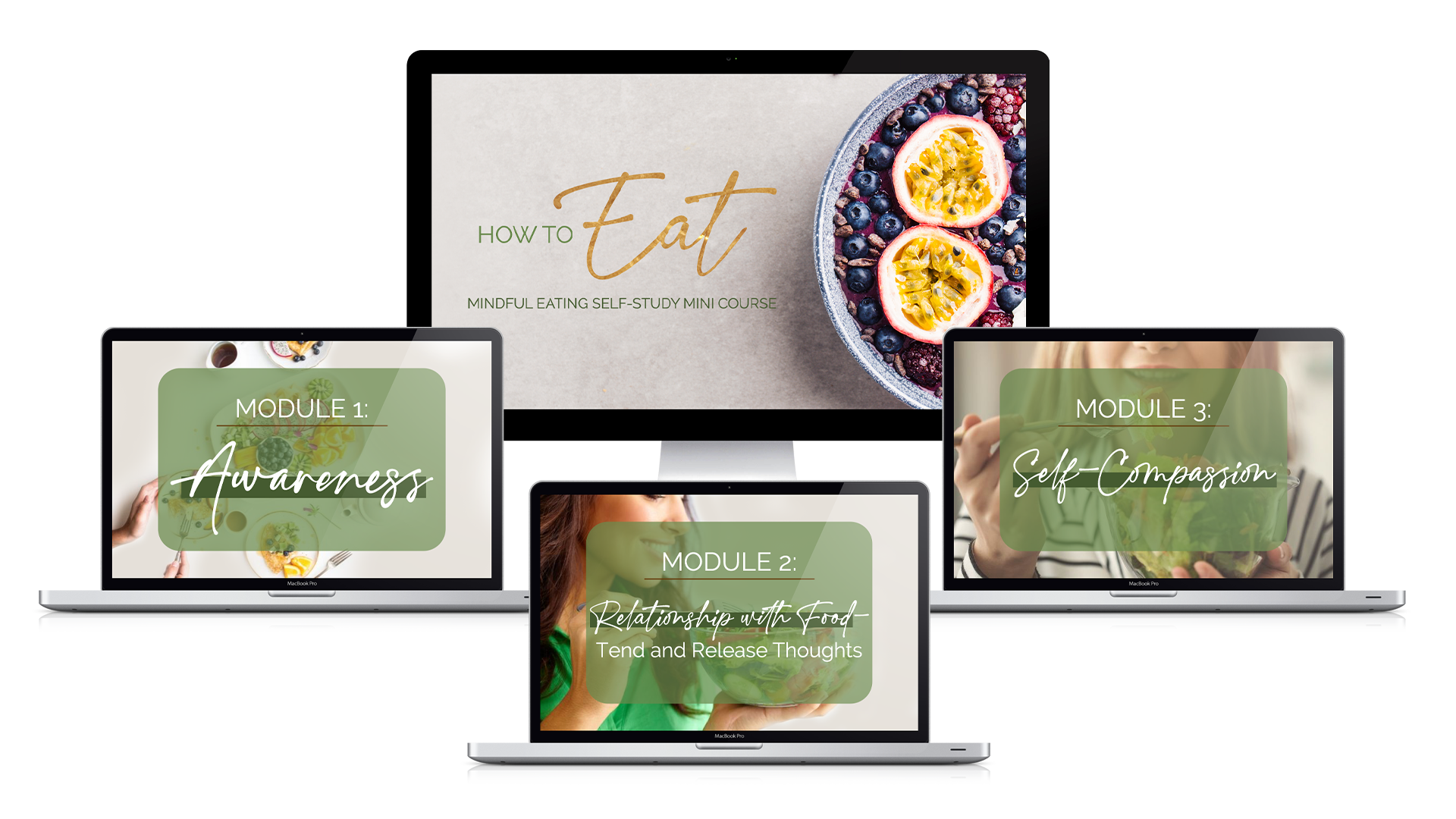
What, Why & What to Do
These words – emotional eating, disordered eating and eating disorders – are often tossed around by people who don’t understand the complexities of an individual’s relationship with food. Your relationship with food, I’ve learned from decades of serving those struggling with these issues, is as unique as you are. Some folks have very little emotion in their relationship with food, while others are near pure emotion. One is not better nor healthier than the other, though one is easier when it comes to shifting your eating.
Why are some of us so emotional about food? When does it become a problem?
Everybody eats. Every human feels the effect of what they eat. So, in one sense – of what happens in their own body and mind – everyone IS an expert. An expert of their own experience.
When it comes to naming other people’s experiences, however, understanding the deeper currents of our own behaviors, and recognizing when we’ve blasted past the guardrails of healthful behavior, gets complicated. Food is a stand-in for everything – from love to politics to economics. I see a complex relationship with food as a collection of opportunities for self-inquiry and healing.
A Deadly yet Well-Hidden Issue
Why is it important for everyone who eats or cares for an eater to know what these terms mean? Don’t we all want to be slim and look healthy? Actually, no. When it comes to weight, our culture needs a serious re-imagination of what health – and beauty – looks like. I’ve experienced many thin unhealthful people, and many many a healthy full figured woman or man. Science continues to confirm that it’s your behaviors, not the number on the scale, that determines your health. Let’s celebrate our beauty in it’s unique fullness and the beauty of every body shape and size, every age and color.
When my own eating disorder was most active (and I looked most like an ‘after’ weight-loss picture) was the summer of my sophomore year at Cornell, where I was, ironically or not, a nutritional biochemistry major. I worked on the beach on Hilton Head Island with a group of friends, drank a six-pack of diet coke by day, something alcoholic by night and allowed myself one bag of the junk food of my choice each day. Nothing else. There was cocaine.
When I returned to school, I was showered with enthusiastic attention for my petite boniness. My mother cried when she saw me, correctly worried for my health and maybe my life. I eventually found the help I needed, through counseling and a body-kind yoga practice. Aspects of a disordered eating mindset, and the physical fallout of decimating my physical body haunt me to this day. Now, however, I have a bagful of nutritional, emotional, mental and physical tools to rebalance.
Eating disorders are the deadliest of psychological disorders. A young woman with anorexia, for example, is 12 times more likely to die young (2), and 59 more likely to commit suicide (3) than a young woman without it. Eating disorders don’t discriminate – every gender, color, religion, and corner of the planet have their versions, and we are all susceptible – particularly young people in the formative years of their identify. Even the wold of yoga struggles mightily.
In addition to high risk of death, eating disorders are wildly unbalancing to your physical and emotional well-being. When an individual over-restricts their nutrition, they have inadequate vitamins, minerals, healthful fats and energy to maintain a healthy brain and nervous system. Purging (vomiting) erodes teeth, impares digestion in ways that undermine bone and mental health, and sets a body up for future weight gain. Fatigue, low energy, and inability to think clearly are common.
Here is a mini-primer that can help you understand what these words mean, and if and when it’s time to get some help. I hope it helps you know if your health is at risk or you are simply a human enjoying treats. Treats, by the way, are part of healthy eating.
Food is one of life’s great sensory experiences. Enjoying what we eat without feeling bad about it, or getting compulsive about it, however, is for some one of life great struggles. Happily, there are many dietitians well-versed in how to support you in your journey to finding more peace and balance with food.
Emotional Eating
Emotional eating is when you eat to address an emotion rather than your physical body’s need. Eating when you are stressed, uncomfortable, worried, or bored has physical hard-wiring based in our genetics of survival. Biochemically, stress gets relieved for the moments you are eating. Problem being, eating never solves the real emotional problem you’re being invited to address.
Everybody has this biochemistry, and the more you use it the stronger it gets. It’s easy for emotional eating to slide from sensual delight of occasional treats into a daily mechanism for managing emotions. When you begin to use food as a means of getting through the day, or managing stress, you’ve got it. Imbalance isn’t far behind.
Every human who has access to bountiful food and stress does some emotional eating. It’s normal. We all, on occasion, overeat. When emotional eating leads to consistent over-eating or begins cycles of deprivation then binging, and the emotions become fear-dominated and increasingly self-incriminating, that’s when it’s become something else. It has led to disordered eating.
Disordered Eating
Every eating disorder begins with a diet. Whenever you manipulate what you eat to create an effect – be it to lose or gain weight, or even to address a biomarker like high blood glucose (sugar) or high blood pressure, you are on a diet, and therefore at risk. You are no longer eating in balance.
Some nutritionists would say ‘diet’ is a dirty word and we should never ever do them. I would say that whenever you ‘diet’, be under the care of a qualified nutritionist. That’s because any diet as I’ve described it, puts you at some risk for emotional or disordered eating. These are next steps along the continuum toward an eating disorder. A qualified nutritionists will spot that slide (hopefully) and curb it before it becomes a psychological problem.
What, when and how you eat impacts your psychology to a impressive degree. So, when you alter how you eat, it’s serious stuff. The media is a nutrition disaster – filled with conflicting and often incorrect or poorly described nutrition information. Some seeking health quickly get lost in binge-deprivation cycles, obsessiveness or compulsion and compensatory food behaviors. Nutrition doesn’t work like that (quick adjustments don’t work for weight or preventing chronic disease – it’s not a straight-forward equation). Over time restrictions change your body composition, which changes your metabolism and nutrient needs. It also impacts your mental health through long-term inadequacy of nutrients needed for brain and nerve health, and psychologically through deprivation. It’s the plight of the ‘good dieter’ that over time, you loose muscle mass and create physical and psychological imbalance through restricting. When it comes to weight, slow and steady always wins the lifelong health race.
Disordered eating is when you follow a diet that erodes your physical and mental well-being. You continue the pattern even when you experience fatigue, irritability, illness and other signs that the diet isn’t working for you. Overly restrictive diets, over exercise, and eliminating entire types of healthful food for weight, often do the trick to create a lifetime on a rollercoaster of suffering. Managing weight and health doesn’t have to be that way.
Eating disorders
Eating disorders (ED) are a collection of psychological imbalances of abnormal or maladaptive eating and related behaviors. Each type of eating disorder is based on signs, symptoms and behaviors. The science of eating disorders is young and evolving, as people with identical symptoms might have different underlying causes and benefit from different strategies. It’s a fluid, moving line of when and how emotional eating and disordered eating turns into a diagnosable eating disorder. Everyone is different. With effective treatment more available, if you struggle with eating, err on the side of getting help.
Here are a few eating disorders defined by the Diagnostic and Statistical Manual of Mental Disorders, 5th edition. These definitions are not complete nor exhaustive, but if you recognize yourself in the next paragraph, you can get help.
Anorexia nervosa (heavily restricted eating, intense fear of weight gain, body image disturbance); Bulimia nervosa (recurrent binge eating, feeling a lack of control, inappropriate compensatory behaviors, self-evaluation focuses on weight); Binge eating disorder (regular binge eating without compensatory behaviors); Avoidant/restrictive food intake disorder (ongoing excessive dieting); Night eating syndrome (binging at night); Purging disorder (vomiting after binging); to name a few.
An individual with an eating disorder can be any weight – under, over or normal. An eating disorder can become more and less severe, based on how frequently the behaviors occur. An eating disorder can be inactive, then reactivate under stress.
Until an individual has long-term treatment that instills confidence in nutritional adequacy without disordered behaviors, the self-knowing to understand when disordered cycles are underway, and when support is needed, their eating disorder remains active. Many nutritionists have issues with their own relationship with food, yet can provide excellent professional support so long as they have participated in treatment, have access to ongoing support and clinical supervision. An individual with an active eating disorder who has not received treatment from a qualified professional may do more harm than good in supporting healing for those they would like to serve. Clinical supervision (ongoing review of clinical cases with an experienced clinician) is especially helpful for those treating eating disorders.
What to Do?
If you think you have an eating disorder and feel ready to make a change, there are many qualified psychological and nutrition professionals to choose from. In fact many doctors, psychiatrists and psychologists work together with nutritionists on an integrated plan for healing. Your doctor may work with someone, so that may be a place to start.
If you’ve read this far, you’d probably benefit from making an appointment with me! I’ve done this work for years, and helped thousands to women & men find more peace with food. Please know there are many dietitians well-trained to help you, so if you are looking for someone in your state or locally, there are great resources to help you find the right a nutritionist.
Find a trained, experienced pro to help
NEDA – The National Eating Disorders Association – helpline: (800) 931-2237 NEDA is filled with resources & support, including an online screening tool to help you determine if it’s time to get help.
The Academy of Nutrition & Dietetics (AND) – Articles to help you understand eating disorders, and “Find an Expert” directory of dietitians.
EDReferral – Find lists of trained dietitians and other professionals, treatment centers, and information.
Sources
(1) Jessica Setnick, MS, RD, CEDRD. Eating Disorders, Second Edition. Academy of Nutrition & Dietetics, Chicago, IL. 2017.
(2) Sullivan PF. Mortality in anorexia nervosa. Am. J Psychiatry. 1995.
(3) Keel, PK et al. Predictors of mortality in eating disorders. Arch Gen Psychiatry. 2003.





